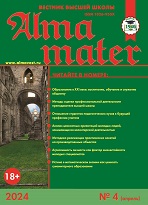UDC 316.6-056.4:004
https://doi.org/10.20339/AM.12-20.082
E.M. Zakharova is Cand.Sci. (Pedagogy), Ass.Prof. e-mail: mem229@mail.ru; S.M. Bernikova is Senior lecturer e-mail: svetlana_minina@mail.ru; M.I. Bakina is student e-mail: akeri.akkella@mail.ru; and M.V. Andreeva is student e-mail: marina-2589@mail.ru , all at Kurgan State University
Researched is the problem of Internet addiction among users of Kurgan region in age range from 13 to 60 years in comparative aspect. In literature review of the problem, the main types of Internet addiction, its symptoms, negative consequences, and prevention directions are considered. Based on diagnostic methods of L.N. Yurieva and T.Yu. Bolbot, as well as Kimberly Young, 109 respondents were tested for Internet addiction. Comparative characteristics of various indicators of Internet addiction in three age categories are presented: schoolchildren (13–18 years old), students (19–30 years old) and adult users (31–60 years old). The study showed that the majority of Internet addicts are in youth age category (50%), 30% of school children are covered by Internet addiction, and there is no Internet addiction in adult environment. At the same time, the second stage of Internet addiction, that requires therapeutic measures, is also more pronounced in the youth environment (10%), in the school environment of such users are only 2%. The hobby stage is more typical for adult users (83%), 64% of school children are engaged in it, and 20% of young people are engaged in it. The following types of preferences prevail among dependent users: self-addiction in 47%, dependence on social networks in 42%, cyber-addiction (computer games) in 11%.
Key words: internet addiction, setegolizm, cyber-addiction, diagnostics of Internet addiction, stages of Internet addiction.
References
1. China has officially recognized Internet addiction as a disease. Medportal. 11.10.2008. URL: http://medportal.ru/mednovosti/news/2008/11/10/addiction/
2. Galaev, S.V. Motivation of professional development of future teachers-psychologists in the conditions of informatization of education. Izvestiya Saratovskogo universiteta. 2008. Iss. 2. P. 72–76.
3. Gureeva, A.Yu., Sizov, S.V. Internet addiction: current state of the problem. Russia. Topical issues of psychotherapy and clinical psychology. 2015. No. 2. P. 127–129.
4. Dolganina, V.V., Shirvanyan, A.E. Influence of social networks on formation of psychological dependence in students of pedagogical higher education: practical aspect. Problems of modern education. 2020. No. 1. P. 39–48.
5. Dmitrieva, K.O. Influence of the modern Internet on human life // Culture, personality, society in the modern world: methodology, experience of empirical research. Ekaterinburg, 2019. P. 715–723.
6. Columba, M.V. Influence of gaming computer addiction on the emotional sphere of adolescents. Cooperation without borders: expanding the framework of the social economy. 2017. P. 644–652.
7. Kuletova, G., Turmaganbetova, A.T., Umbetova, B.E. The Problem of Internet addiction among young people. URL: https://yandex.ru/q/question/hw/kak_oformliat_elektro (accessed on 02.04.2020).
8. Lutoshliva, E.S., Smirnova, I.A. Internet addiction of the individual: main characteristics and features. In: Psychology of education: state and prospects. Irkutstk, 2014. P. 257–261.
9. Malyshev, I.V. Features of Internet addiction in students in modern conditions. Insurance readings. 2018. No. 26. P. 201–206.
10. Maslova, V.S. The problem of Internet addiction among young people. Culture and education. 2015. No. 2 (18). P. 11.
11. Minina, E.M. Organization of valeological activities in general education institutions. Kurgan, 1999. P. 73–75.
12. Nikitenko, S.V., Nedbaeva, S.V., Aldakimova, O.V. Psychological and pedagogical conditions for overcoming Internet addictions in adolescence. Problems of modern pedagogical education. 2020. No. 67-3. P. 295–298.
13. Nosova, Yu.G., Pisarevskaya, M.A. The problem of Internet addiction in psychological and pedagogical science. Moscow, 2015. P. 113–118.
14. Ovdienko, D.A., Somov, M.V. Prevention of information dependence in adolescents. In: Youth and science: actual problems of fundamental and applied research. Moscow, 2019. P. 313–316.
15. Kimberly young’s Internet addiction test. URL: https://wiseparent.ru/test/тест-кимберли-янг-на-интернет-зависим/
16. Tulegenova, A.G. Internet Gaming addiction in the student environment. Problems of modern pedagogical education. 2014. No. 45-5. P. 292–299.
17. Chelysheva, I.V. Selfie addiction or new art? Crede Experto: transport, society, education, language. 2018. No. 1. URL: https://cyberleninka.ru/article/n/selfi-zavisimost-ili-novoe-iskusstvo
18. Chernova, N.M., Begunov, M.A. School children and the use of the Internet. Concept. 2017. No. S9. P. 51–55.
19. Shakhov, L.M. Positive and negative impact of the Internet on youth socialization. In: Socio-economic and demographic aspects of implementation of national projects in the region. Ekaterinburg, 2019. P. 429–435.
20. Yurieva, L.N., Bolbot, T.Yu. Computer addiction: formation, diagnosis, treatment and prevention. Dnepropetrovsk, 2006.











.png)






